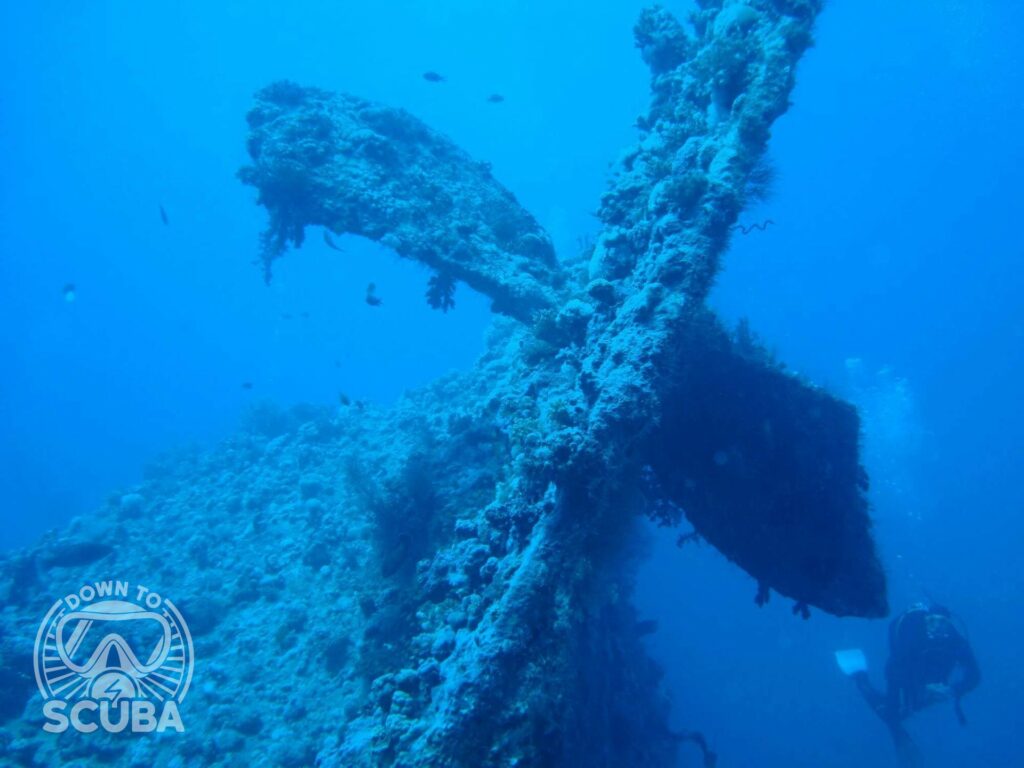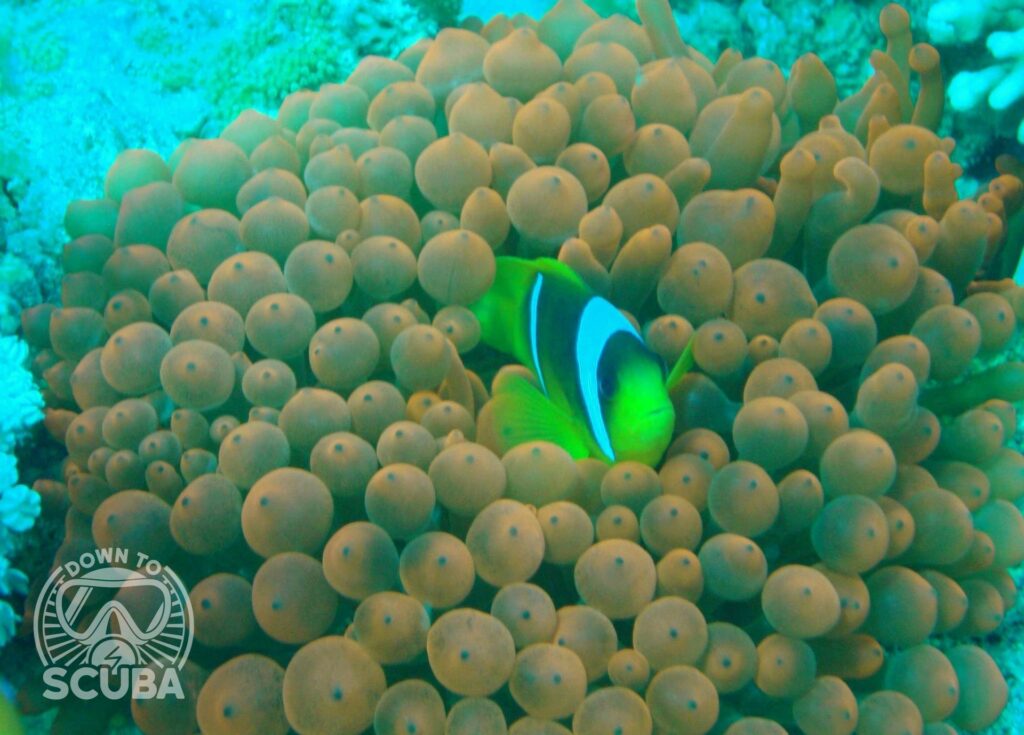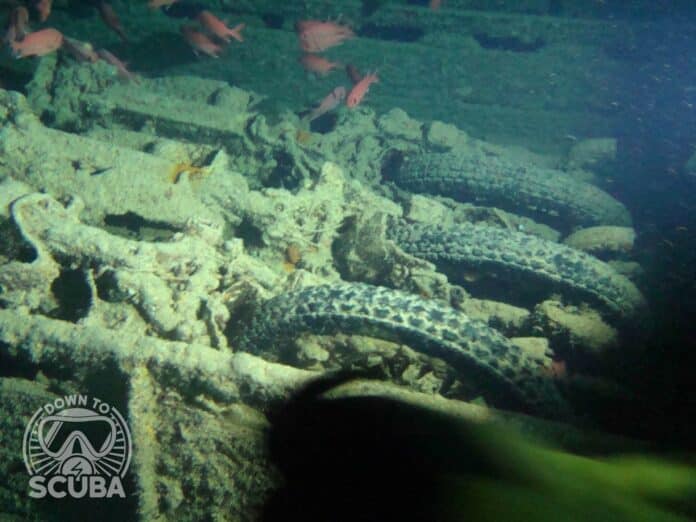WHERE ARE WE GOING?
Today we are diving in Sharm El Sheikh, Egypt!
WHY ARE WE DIVING IN SHARM EL SHEIKH?
Sharm El Sheikh is known for its cheap certification courses, great reefs, the Ras Mohammed National Park, and several scuba diving wrecks. There are many dive shops and dive sites around Sharm El Sheikh.
We chose this location because we were already interested in a trip to Egypt; my wife wanted to get her Open Water certification and I wanted to dive at a wreck. This had nothing to do with our choice, but Camel Dive Club welcomes divers with disabilities. There was a diver in a wheelchair on several of my dives and they were great with getting him onto the boat and into/out of the water.
Check out the different types of scuba certifications available.
HOW DO WE GET THERE?
We took a short flight from Cairo to Sharm El Sheikh, where we were picked up by our dive club/hotel and driven to the hotel that was a half-hour away.
The only difficult part was purchasing the tickets from Nile Air. My credit card kept flagging the purchase as fraudulent and would not complete the transaction, but also offered no explanation, making it look like the issue was Nile Air’s website. The only way I could get it to work was to be on the phone with the credit card fraud department, while making the purchase and have them approve it in real time.
We took a 6+ hour bus back to Cairo, which allowed us an extra day of diving. The dive club also provided transportation to bus station.

WHICH DIVE SITES ARE MUST-SEE?
There are over 30 different sites. Some are accessible by shore diving, and others require day trips by boat.
In Ras Mohammed National Park, I dove at Ras Za’atar, Jack Fish Alley, Shark & Yolanda Reefs, which includes the remains of a 1980 wreck that scattered many toilets and bathtubs on the ocean floor. The first dive at this site had a strong current and we barely made it to the wreck. A few days later there was no current and had time to swim through a small cave and around the wreck.
Dunraven Wreck (max. 28 meters)
The Dunraven Wreck was a British Steamship that sunk in 1876. You can enter the hull at the rear of the ship or several other large holes.
S.S. Thistlegorm (30m)
S.S. Thistlegorm was a British, merchant navy ship that was sunk in 1941 by the Germans. The ship’s cargo consisted of trucks, motorcycles, jeeps, tanks, plane parts, guns, ammunition, and locomotives.
The Temple (20m)
I took my refresher dive here. Nice coral and eels. I was a little preoccupied with remembering my training.
Woodhouse Reef (30m)
Woodhouse Reef is where we worked our way down a canyon, exited, and completed a drift dive along the wall.
Thomas Reef (20m)
This was a great drift dive that is worth revisiting. If the current is good and you are good with your air consumption, then you can make it all the way around the circular reef. We only made it 75% of the way. If you wish to go deeper, there is a canyon at 35m.
Ras Nasarni (6-30m)
This dive site had a nice current that took you along the shore, past snorkelers and freedivers. What I remember from this site is my guide high-fiving a freediver and seeing my first sea turtle.
TELL ME MORE
There are a few dive sites accessible from shore, but all the sites I dove were off a boat.
The Thistlegorm is the furthest dive site and takes about 4 hours to reach from Sharm El Sheikh. Ras Mohammed National Park was about 2 hours away and the rest were closer to an hour.
DO I NEED ADDITIONAL EQUIPMENT?
It depends on the time of year. I was there in late October and my guide preferred a long wetsuit. I was comfortable with a short wetsuit. If you dive at night or go into the Thistlegorm wreck, torch rental is an extra cost.
Use our wetsuit temperature guide to find out if you need a long or short wetsuit on your next diving trip.
The dive center I used really pushed enriched air. If you were certified there, you received a free nitrox upgrade for life and I took advantage of it on all my dives. Enriched air was a requirement to dive the Thistlegorm wreck, but you could avoid the certification costs and pay for training, which happened to take place on that dive.

WHAT LEVEL CERTIFICATION SHOULD I BE?
There are sites for all new divers; Open Water divers and technical divers. You must have 20 dives before they will let you into the Thislegorm wreck. Fortunately, I was able to stay an extra day and make the dive as my 21st. They were very strict on that rule and could not be talked into letting it be my 20th dive.
WHAT ARE THE CONDITIONS?
The air temperature was consistently 30°C and the water 27°C on my dives. The visibility was always good. There can be strong currents and we did multiple drift drives and it varies by day.
HOW MUCH WILL I SPEND?
Discounts were available if you booked ahead. Pricing was a la carte. Standard dive prices were 75 Euros for 2 dives by boat, with an optional 3rd dive for 27 EUR.
There were supplemental costs for the Thistlegorm (90 EUR), Dunraven (40 EUR) Ras Mohammed National Park entry fee (5 EUR), full equipment rental (30 EUR), Nitrox per 12L tank (6 EUR).
WHERE DID YOU STAY?
We stayed at Camel Dive’s hotel, which offered discounts if you were diving or taking classes with them. Prices varied seasonally, as well as length of stay, classes being taken, number of dives and meals eaten at hotel.
I had no complaints with the room. It was clean and basic. The breakfasts were fantastic. I was a little annoyed that they were preaching against the use of plastic, but your only water options were plastic bottles that they were happy to sell you.
DESCRIBE YOUR PERSONAL EXPERIENCE
The diving at Sharm El Sheik is fantastic and affordable. Similar to the prices when diving in Koh Tao, Thailand. It was laid back and very different from the rest of Egypt. There wasn’t much happening on land that interested me. It is a resort town, which is not my style, and it is still recovering from the loss of tourism after a terrorist attack.
I would recommend diving in Sharm El Sheikh. If I was living in Europe, I would find my way back repeatedly to dive. It isn’t the easiest or cheapest trip from the US, but I hope to come back someday.
WHAT DO WE DO ON SURFACE INTERVALS?
I didn’t do much other than dive. I would like to have hiked Mount Sinai and visited Saint Catherine’s Monastery, but I did not allow for enough time to go from 30m below sea level to 2,285m above sea level.
